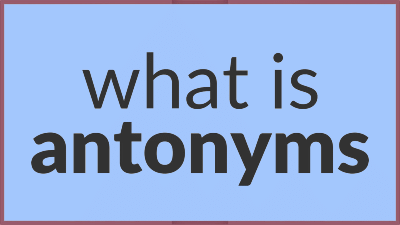Important Rules: Antonyms | English Language & Comprehension for SSC CGL PDF Download
| Table of contents |

|
| Introduction |

|
| Rule 1 – Answer Choices |

|
| Rule 2 – Types of Antonyms |

|
| Rule 3 – Root Word, Prefix and Suffix |

|
Introduction
Rule 1 – Answer Choices
Pay attention to answer choices with positive and negative charges. Nearly any given word can be linked to either a negative or positive charge.
Try to discern whether each word in the following list has a –
- positive (+)
- negative (-), or
- neutral (=) charge.
Choose the best synonym/antonym based on its charge.
Rule 2 – Types of Antonyms
Antonyms have been categorized into two parts, for a better understanding of the students.
Types of Antonyms:
- Gradable Antonyms: they offer a middle ground to all the words and act on a graded spectrum i.e. within a range.
- let’s take a word fat. Now it’s antonyms can be thin, skinny, slender, slight, slim, (Here you can see there’s a range of words from very thin to not too thin.)
- old – new, young, youthful, current, fresh, modern, green. (here old was either age or time, hence all antonyms fall into a broader range)
- Complementary Antonyms: these are the ones that stand in complete contrast to each other.
- push and pull
- In and out
- Up and down
- right and left
- Relational Antonyms: Also known as relational antonyms, the relation of these antonyms are universally opposite.
- black and white
- husband and wife
- pen and paper
Rule 3 – Root Word, Prefix and Suffix
Responding to a question without understanding its meaning can pose a challenge. Nevertheless, if you possess knowledge of the root words and prefixes or suffixes, the task becomes more manageable.
Root Words:
The fundamental or primary word capable of generating various words while maintaining a related meaning is referred to as a root word.
For example:
- Form – meaning Shape
- reform – rebuilding the shape
- deform – breakdown a shape
- Formless – something that has no shape.
Prefix:
Words that are placed before the root word to change its meaning.
- Positive prefix – pre, pro, re, super, en, co etc.
- Negative Prefix – de, ir, im, mal, un, non, a, in etc.
For example:
- able – unable
- sane – insane
- respect – disrespect
- Operate – cooperate
- code – decode
- symmetrical – asymmetrical
- sure – ensure
Suffix:
Words that are placed after the root word to change its meaning.
- Some of the suffix are: less, ful, ment, ion, ive, dom, ism, ness, ship etc.
For example:
- Free – freedom
- Friend – Friendship
- attain – attainment
- happy – happiness
- harm – harmful
- harm – harmless
Examples
Q1: Find the opposite of:
Pricey
(a) Lavish
(b) Valuable
(c) High
(d) Economical
Ans: (d)
Here both words that are pricey or expensive and it’s opposite that is economic, follow a continuous spectrum.
And since lavish, valuable and high are synonymous to the given wor(d)
Hence option D is the correct one
Q2: Find the antonym of:
Correct
(a) Wrong
(b) Right
(c) True
(d) Appropriate
Ans: (a)
The word opposite of correct will be incorrect or wrong. And it’s a complementary antonym representing two opposite possibilities as either an act can be wrong or right, true or false.
Hence option A is the correct one.
Q3: Find the antonym of:
Present
(a) Absent
(b) Available
(c) Existent
(d) Coeval
Ans: (a)
The opposite of present is absent. And since all the other options hold a similar meaning to the given wor(d) Therefore option A is the correct one.
Q4: Find the antonym of:
Doctor
(a) Physician
(b) Expert
(c) Patient
(d) Scientist
Ans: (c)
The opposite of a doctor will be a patient. Hence option C is the correct one since all the other options fall in the same category of the given wor(d)
Q5: Find the antonym of:
Predator
(a) Prey
(b) Hunter
(c) Killer
(d) Attacker
Ans: (a)
Predator means hunter, hence its opposite will be prey or a victim.
Therefore option A is the correct one.
|
133 videos|234 docs|152 tests
|
FAQs on Important Rules: Antonyms - English Language & Comprehension for SSC CGL
| 1. What is the importance of understanding antonyms in exams? |  |
| 2. How can understanding antonyms help in exam preparation? |  |
| 3. Are there any specific strategies for learning antonyms effectively? |  |
| 4. Can understanding antonyms help in other areas besides exams? |  |
| 5. How can one improve their antonym recognition skills? |  |
















